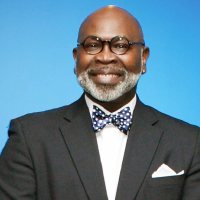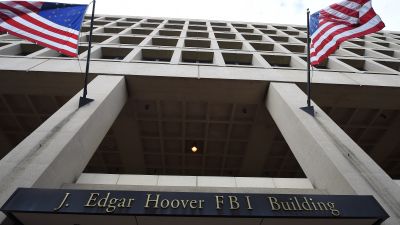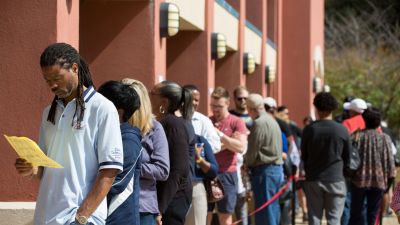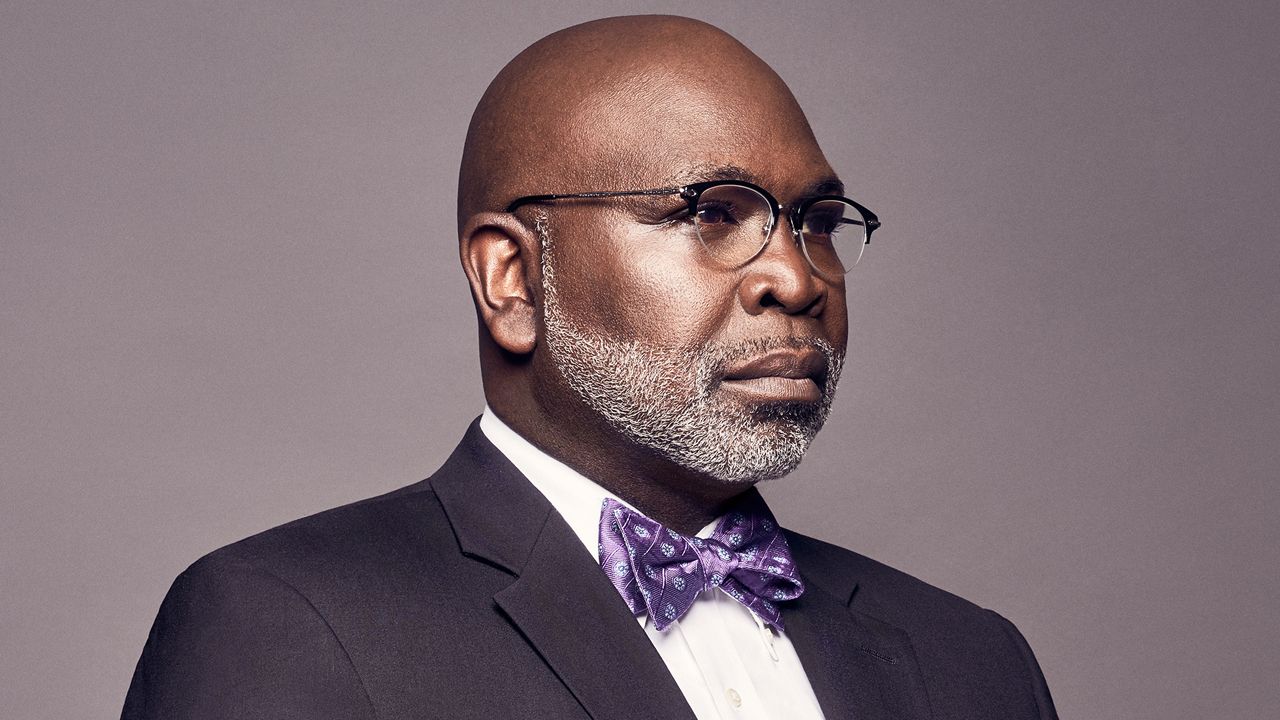
Dr. Willie Parker (Photo by Chad Griffith)
The following passage is excerpted from Life’s Work, a new book by Dr. Willie Parker, published by 37 Ink/Atria Books.
His memoir came about after a moving 2014 profile of Dr. Parker and his work in Esquire magazine. There is only one abortion clinic left in Mississippi and women travel many miles to see Dr. Parker, who drives there from his home in Birmingham, Alabama, to perform services a few days a month.
In 2009, Dr. Parker stopped practicing obstetrics to focus entirely on providing safe abortions for the women who need help the most — often women in poverty and women of color — and in the hotbed of the pro-choice debate: the South. He is now an itinerant abortion provider working in Mississippi, Alabama and Georgia.
In this excerpt, Dr. Parker, who is a religious man, talks about his personal journey and how he came to be one of the nation’s foremost Christian reproductive rights advocates fighting to preserve a woman’s right to choose.
Dr. Parker’s Journey
At 6:30 a.m. on procedure day, the abortion clinic waiting room at Reproductive Health Services in Montgomery, Alabama, is as hushed as a church. Inside, beyond the bulletproof doors, the women are waiting for me, occupying every vinyl-covered chair, occasionally perched on windowsills: 25, 30, as many as 50 women sometimes. When I pass through the room in my street clothes — the uniform of sweats, baseball cap, and prescription shades that allows me to hide in plain sight — most of them won’t even look up. But occasionally a woman will have heard of me, the “nice black doctor” at this clinic, and she’ll meet my eyes and smile. She may believe that I’m going to get her through this, whatever “this” means to her, and hope that by making contact, with a glance, she will show me that she is an individual, with a story, and reasons, and dreams of her own.
I am here, in this crowded abortion clinic in Alabama — or Mississippi, or Georgia, where I also work — to provide abortions for women because they say they need them. I am a Christian, raised in churches right here in the South — in Birmingham, an hour-plus drive from Montgomery.
In the black churches of my childhood, an unplanned pregnancy was reason enough for a public shaming, or even expulsion from church ministry. A girl who became accidentally pregnant might be forced to stand up before the congregation on a Sunday morning and beg forgiveness for her sins, while the equally sexually curious boy who helped get her pregnant sat, with his brothers and sisters in Christ, in judgment of her. Unbeknownst to me, the women in the churches of my youth must have sometimes had abortions — of course they did, legally or illegally — but no one ever spoke of them.
This was the Christianity I grew up in, and it has taken me decades of emotional, spiritual and intellectual wrestling, with my conscience and with my world, to get to the place where I am now. I remain a follower of Jesus. And I believe that as an abortion provider I am doing God’s work. I am protecting women’s rights, their human right to decide their futures for themselves, and to live their lives as they see fit. Today, as I write this, access to safe and compassionate abortion care is under unprecedented threat, most often from people who call themselves Christians. What I do is unfathomable to my faithful opponents, yet preserving that access is my calling. As a Christian and as a doctor, I am committed to protecting women’s health.
This moral understanding came to me slowly, but it started to coalesce more than a dozen years ago when I had what I call my “come to Jesus moment” around the subject of abortion. From childhood I had long inferred that abortions were wrong, and for the first half of my career as an OBGYN, I refused to perform them. But as I matured in both my faith and my profession, I found I was increasingly at odds with myself, an inner conflict that sat uncomfortably with me. I never questioned women’s individual choices, but until I found clarity and certainty around the abortion issue — what I call the head-heart connection — I recused myself, as a practitioner, from the fight.
Since achieving that clarity of mind and fullness of heart that liberated my understanding around this work, my passion for it has doubled. I have been working as an abortion provider for more than a dozen years with increasing energy and focus. I moved back to my hometown of Birmingham to care for women living in communities like the one in which I was raised. Some of my patients, poor and black, might easily be one of my three sisters or a cousin or an aunt — others might be anyone: you, your niece, your daughter, your mother, or your best friend; many are women with some means, in the middle and upwardly mobile classes. Some of my patients have formulated strong political opinions about abortion, but more have not and merely walk through my doors because they’re doing what they deem necessary for themselves.
The Crusade Against Choice
I do this work in the context of a ramped-up national crusade against it — one that promises, with a Republican president and Congress, to intensify. Calls from the antis to overturn Roe, to repeal the Affordable Care Act, and to defund Planned Parenthood are growing ever louder. Each one of these backward moves will not only restrict women’s access to safe, affordable abortion care, but will diminish women’s access to good health care in general, putting their lives and the lives of their children at risk. And poor women and women of color will bear the brunt of this political posturing by ideologues — as they always do.
Already, I have consciously put myself on the front lines. Since 2010, when right-wing extremists swept the nation’s statehouses and legislatures, more than 300 state laws have been passed aimed at restricting access to abortion — despite the fact that it is legal. In 27 states, women are now forced to wait one, two, or even three days between receiving mandatory “counseling” (which often contains bogus information) and obtaining an abortion, a barrier that puts an undue burden on working women, women with children, and women who live in rural areas, requiring them to take time off work and spend additional money to travel back and forth to a clinic that may be two hundred miles from home.
Fourteen states since 2010 have banned procedures after 20 weeks — a violation of Roe. Thirty-seven states have circumscribed “medication abortion,” placing limits on patients’ access to the FDA-approved pill that ends pregnancy in its early phases. And more than two dozen states have taken aim at the daily operations of the clinics themselves, placing irrational hurdles in their way with the motive of shutting them down. These laws have had the desired effect. Since 2011, more than 160 abortion clinics have closed. These laws have been passed so invisibly, so incrementally, that few have even noticed them. But they are affecting the real futures of real women by forcing them into lives they did not choose.
I think of the 21-year-old woman I saw in the only open clinic in Mississippi in 2013. Born and raised in the Delta, she was home for the summer, having graduated from a Division I university, where she studied on an athletic scholarship, and she was on her way to a law school. Finding herself seven weeks pregnant, she sought my care, and I did her abortion without complication. Talking with her, I saw how clearly she saw her life.
She was on the precipice, about to write a new story for herself. She would not be another dirt-poor, single mother. She would live in a world of limitless possibility, which she would create with her law degree. I sensed in her no flinching, no hesitancy, no reservation about her abortion decision. All her life, this woman had been making decisions with her future in mind, and when I saw how consequential this one was to her, my resolve to do this work increased.
The “Antis”
When I became an abortion provider in 2002, there were 12 abortion clinics in my home state of Alabama. Now there are five. Next door, in Mississippi, there is only one. To do abortion where the need is greatest is to be itinerant, always on the road, because the distances between clinics are so great. In the car, I listen to all kinds of music: Miles and Coltrane, Kenny G and Prince, Public Enemy and the Notorious B.I.G. I am a devotee to books on tape. My time on the road has become “me time.” I am always encumbered with laundry and luggage — the chores mandated by a nomad’s existence.
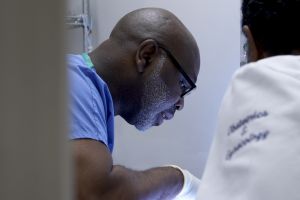
Dr. Willie Parker is one of two doctors who perform abortions in Mississippi. He says that it’s hard for many protesters to accept that he performs abortions because he is Christian. (Photo courtesy of Trapped documentary, Trilogy Films)
Like every busy person, I keep a fantasy future in my mind; I have purchased cooking pots and a double bass for the leisure I imagine but do not possess. Instead, I fill the gaps in my schedule with my other vocation: speaking engagements and board meetings, traveling the country like a 21st-century Saint Paul, preaching the truth about reproductive rights, because I have come to see that I’m the one, as the old saying goes, that I’ve been waiting for. As I drive long miles I become contemplative, and I reflect on my heroes: Martin Luther King Jr., Malcolm X, Sojourner Truth, and Harriet Tubman — exemplars who carried the lives and aspirations of a whole people on their backs.
My five brothers and sisters tell me they worry for my life, and I hear their concern. I understand that my commitment to this work puts me at risk. Eleven people, including four doctors, have, since the passage of Roe v. Wade in 1973, been assassinated for this work — killed in cold blood for the so-called sin of providing safe and legal health care for women. Rationally, I know this. But I reiterate to my siblings, and my concerned friends, my vow: I refuse to give in to fear. The truth is that I am more afraid of living a life of cowardice, of allowing any anxiety over prospective harm to keep me from my convictions. I can live with the awareness that someone might harm me. I am not so sure that I am brave enough to live with the awareness that I was too afraid to do what I knew to be right.
Though my conscience is clear and I am sure of the righteousness of my path, when I pull into the parking lot in Montgomery, or Tuscaloosa, or whatever abortion clinic I’m working in that day, I nevertheless experience an unbidden primal shiver of fear. For standing there every morning, no matter how early the hour, in the melting heat or in the driving rain, are the picketers — usually middle-aged white men who scream at me. “Murderer!” they shout. “Baby killer!” “Filthy Negro abortionist!” I do not for a second imagine that they have right on their side. I am not by nature easily intimidated.
Yet their intention is to provoke me, and I do get provoked. These men incite a rage in me that I am able to quell most hours of the day. But at that early hour, sitting in my car, sometime around dawn, I am infuriated that I, who am in my fifties, gray-bearded and entirely bald, a physician with a medical degree from the University of Iowa and a master’s in public health from Harvard University, have to do a version of a perp walk in order to enter my own place of work. And I am aware that, even though the intention of these protesters is to throw sticks, not stones — the truth is, you never know. One of them might come unhinged at any moment; any one of them might be carrying a gun. So while I have refused to hide, to hire a bodyguard or wear a bulletproof vest, it’s impossible to escape these thoughts: People have been assassinated for what you do. This could be your last day.
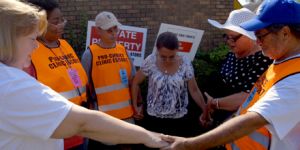
Clinic escorts praying. (Photo courtesy of Trapped documentary, Trilogy Films)
Every morning, after I turn off the ignition, I sit in my car and collect myself, to quiet myself down. I channel the courage of the civil rights legacy that I have studied, and I correlate these verbal assaults to those, much fiercer and more relentless, that Dr. King and others withstood every day. As I open the car door, I remind myself of what my mother told me when I was eight years old, the first time anyone ever called me “nigger”: I should never hit someone unless he hits me first. I take a deep breath and I gather my stuff: keys, laptop, phone, bag. I do not engage. I exit my car and use the remote lock. I stand up straight, my eyes focused on the ground, and I walk, neither fast nor slow, toward my place of work.
It is never lost on me that the women in the waiting room have had to walk past these protesters, too. Even if they were escorted to the door by a cheerful young pro-choice activist with bright pink hair who carries a protective rainbow umbrella, they’ve heard the vitriol — different from the insults hurled at me, but no less offensive. “Think twice!” “Don’t murder your baby!” The antis shout these things, as if these women had not minds of their own. As if their decision fails to merit respect. As if they were not, as most of them are, adults exercising a legal right to make a private health care decision for themselves. (Imagine, if you will, these verbal assaults being hurled at any other person for having made any other consequential health care choice: the decision to pursue a potentially fatal course of chemotherapy, for example. “Don’t risk your life! Suicide!”)
The protesters find it so easy to insult the women who come to me seeking care — as if rationally deciding to terminate a pregnancy makes a woman heedless and irresponsible like a child. In my experience, the opposite is true: By the time a woman finds herself in my waiting room she has already walked a long, introspective road. She has had to take a good, hard look at her life. She has taken a world of contradictory and sometimes difficult factors into account. Whatever sex act got her here — an intercourse lit by love, passion, lust, hope, indifference, and, yes, sometimes incest or rape — is long past and obliterated now by more pressing, pragmatic concerns.
It is my personal belief that the abhorrence of abortion expressed by the men who place themselves at the barricades in front of abortion clinics is actually a misplaced horror at women’s sexual autonomy. It stands to reason: women’s sexual independence is the thing that men have always wanted to control. But for the women in the abortion clinic waiting room, the sex itself is history and totally beside the point. They are here to pursue their lives.
The Women
Every woman sitting in one of the high-backed chairs in the Montgomery clinic has missed a menstrual period. She has peed on a stick at home or in a public restroom or at a friend’s house or in a dorm and seen the result; in a flash she has had to digest how a new child will alter the future she imagines for herself. She has had to decide who she can confide in and who will judge her or disapprove and thus needs to be lied to or kept in the dark. She has confronted whatever private thoughts and yearnings she may have about her vision for her life, including deeply held and possibly heretofore unexamined ideas about professional fulfillment, love, parenthood, and God. She has had to consider the sometimes viselike practicalities that circumscribe her days: school schedules, work demands, the responsibility of caring for other children or ailing relatives, the reliable and supportive presence — or not — of the person whose sperm entered her body more than six weeks ago, her financial circumstances, her age, the limits of her own health.
By the time a woman is sitting in a clinic awaiting my attention, her intention has been focused and clarified. She has figured out how to scrape together $550 if she’s six weeks pregnant, or as much as $1,400 if she’s further along. She has had to be true to herself, despite the fact that her decision process has been disrupted and corrupted by these new state laws requiring her to be “counseled” — by me, a credentialed doctor, or a psychotherapist — in a ginned-up “protective” encounter that often passes along to these women false or biased information about abortion disguised as scientific truth.
In Mississippi, I am required to inform women that having an abortion increases their risk for breast cancer, a fraudulent fact — a lie! — for which no scientific evidence exists; I tell them what the law requires, and then, in the same breath, I explain to these women that it’s simply not true. In Alabama, every abortion patient must receive a booklet called “Did You Know…”, which repeatedly uses the loaded term “unborn child” interchangeably with the more medically accurate “embryo” or “fetus”; and promotes abstinence as the surest way of birth control. If I could refuse to distribute it, I would. Instead, I hand it to the women, saying the law obliges me to do so, but you don’t have to read it and you can just hand it back.
By the time a woman arrives at an abortion clinic and places herself in my care, she has faced a world of judgment and found that everyone — her boyfriend, her own mother, her pastor, her best friend — has something to say.
To the point: A woman who wants to terminate her pregnancy has to make her decision in the context of a culture that shames her and, increasingly, within the constraints of laws that dramatically inconvenience her. They demean her humanity by presuming to know better than she does what her best interests are. They limit her access to clinics and doctors and they convey to her false information. The underlying assumption of all the new laws is that women can’t be trusted to make their own health decisions; their doctors can’t be trusted to tell them the truth; and scientific knowledge must be subverted in the name of religious truth. I strictly abide by these laws, which I believe violate human freedom, because my first priority is to continue to be able to provide abortions. If I break the law out of frustration or fury and get put out of business, the antis win.
Nevertheless, every day it’s getting harder and harder for the abortion clinics in Alabama (and many other states) to stay open, because while some of the new laws are designed to interfere with a woman’s decision process, others are explicitly designed to impede my ability to go to work. These are called TRAP (targeted regulation of abortion providers) laws, and they take aim at the business of abortion care, creating costly and unreasonable logistical hurdles that abortion providers must clear in order to stay in business.
They require abortion doctors to obtain hospital-admitting privileges — when legislators know that no hospital will agree to give privileges to people like me, partially because many hospitals in the Bible Belt don’t want the public relations headache of seeming to condone abortion by granting such privileges, and also because, practically speaking, there is no financial incentive for them to do so. (Abortion is so safe that patients very rarely require hospitalization; doctors working in outpatient abortion clinics contribute little to hospitals in the way of new “revenue streams.”) The new laws require clinic hallways to be wide enough to accommodate a gurney — when the clinical need for a gurney is virtually nil. They put inefficient and unnecessary restrictions around the disposal of fetal material.
For me and the other physicians who do this work, as well as for the owners of the clinics themselves, these laws require more than a mountain of paperwork. We must be tireless in our vigilance, spending untold dollars complying with every new regulation — as irrelevant to the preservation of women’s health as they may be — and fighting them, in court if necessary, to ensure that a legal service remains available to all. And for her part, a woman who wants an abortion must demonstrate superhuman determination to seek it out. By the time we meet in a clinic waiting room, her resolve is often the most defining thing about her.
It is matched only by my own.
Reprinted with permission of 37 Ink/Atria Books. Life’s Work: A Moral Argument for Choice can be purchased here.

